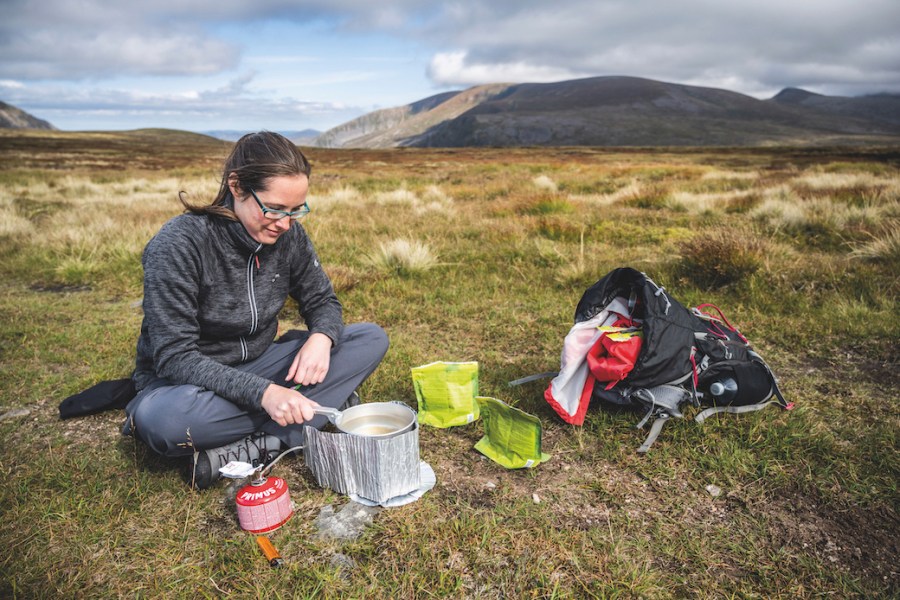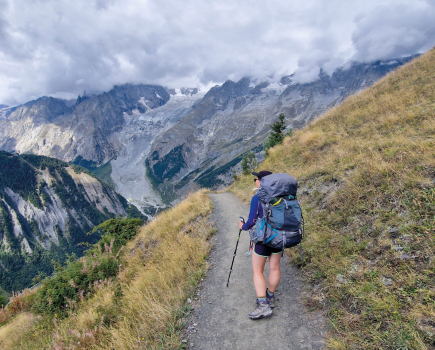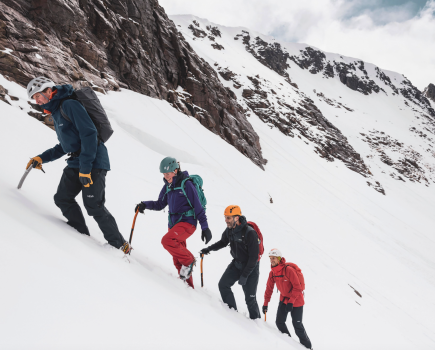On your average day, calorie intake should never fall below 1,200 a day in women or 1,500 a day in men, except under the supervision of a health professional, states advice published by Harvard Medical School. According to the NHS, it’s estimated that the average man should be eating 2,500kcals a day, or 2,000kcals for a woman, which gives us an idea of roughly where our intake of energy needs to be everyday. But when you’re backpacking, you’re going to be burning potentially thousands of calories more than this. Hence, understanding the calories in backpacking meals is important in keeping you fuelled and feeling fit.
Is there an ideal number of calories in backpacking meals?
On a long hill day that requires almost constant exertion, you could burn between 2000 and 3000 more calories while backpacking. This puts an average person’s caloric requirements on mountainous terrain at about 4,000 – 4,500kcal every day.
So, high-energy food is an essential part of your kit list. A backpacking meal worth the cost – yes, they do get quite expensive – will have upwards of 500kcal. In winter, the exertion of hill days and the effort it takes your body to stay warm will mean you burn even more calories. During colder seasons, you should look for meals with at least 800kcal – again, ideally more.
Some brands offer 1000kcal+ options. If you’re able to consume three of these daily, you’ll of course still need to supplement the caloric intake with plenty of nutritious snacks – but that’s all part of the fun!
It’s worth noting that backpackers will burn calories at different rates depending on a number of factors including carrying load, fitness, age, weight, movement efficiency and metabolism, as well as the environment on the hill that day. In strong winds, for example, you’ll need more fuel under arduous walking conditions. When hiking in the heat, you might not feel like snacking but sodium-heavy foods are a good idea to replenish the lost salt in your sweat. Some prefer to hike with electrolyte tablets or fizzy drinks.
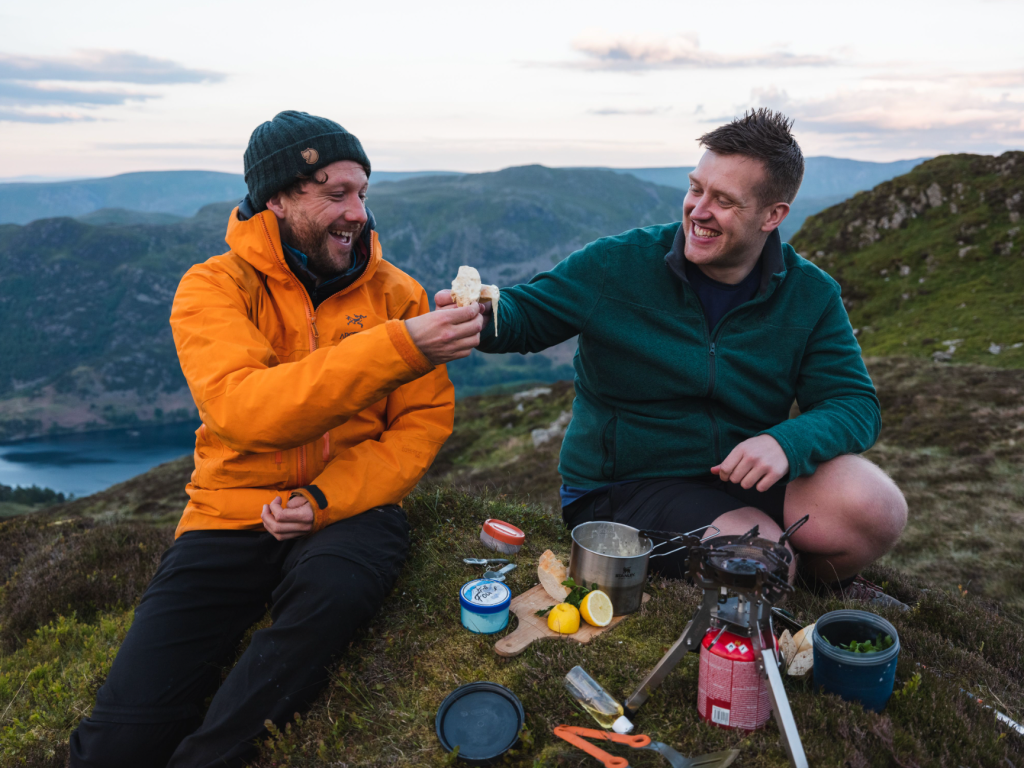
Dining al fresco in the Lake District . Credit: Daniel Toal
If you’re keen to analyse caloric intake needs exactly, some smartwatches and their accompanying health apps offer insight into how many calories you personally might burn on a long hill day. While these are no exact measurements, they should help deduce personal guidelines on how many you need to replenish that burnt energy.
Other sites such as Fitwatch.com – while largely targeted at those seeking weight loss – does offer a helpful tool for backpackers via the Exercise & Activity Calculator.
Carry that weight
Now that we’ve established the vast amount of calories you’ll need to consume to stay fit and enjoy your backpacking trip, some ultralight enthusiasts may be squirming at the thought of all that extra weight in your pack.
Lighter backpacking meals are desirable on tough multi-day treks, but only if the food gives you enough energy to complete each stage safely. Helpfully, backpacking meals don’t just list the calories, but also how many the meal offers per 100g (Calories/100g). A reasonable goal is about 1½ to 2½ lbs. of food (or 2,500 to 4,500 calories) per person per day.
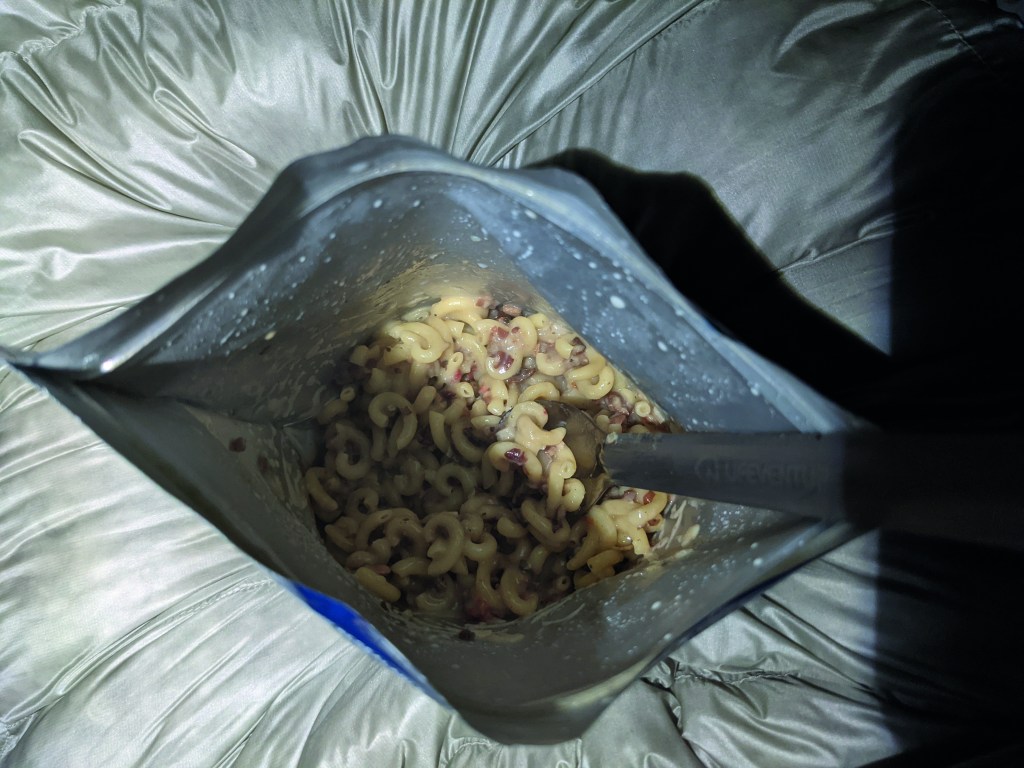
Rehydrating a dehydrated meal pouch. Credit: Alex Roddie
If you’re concerned about the weight of your food, pack for a few days and plan resupply spots along the way – ensuring you check opening times in more remote areas – so you don’t come up short and left with dangerously low supplies.
Over time and with experience, you’ll learn your own bodies’ requirements in terms of food and sustenance. While you’re figuring it out, stay in familiar areas with a back-up route back to civilisation should you need it. There’s almost no greater pleasure than feeling self-sufficient in the great outdoors and learning how to meal-prep, count calories, pack your food and ultimately enjoying cooking in camp will allow you to do just that – settle down to a sweeping view, sit back, relax and put the stove on.
Read more: Outdoor craft and backpacking expert Alex Roddie has put a variety of backpacking meals to the taste test – including those suitable for vegetarian and vegan diets – and shared his findings here. The Great Outdoors’ gear review team have also trialled the best camping stoves on the market.

